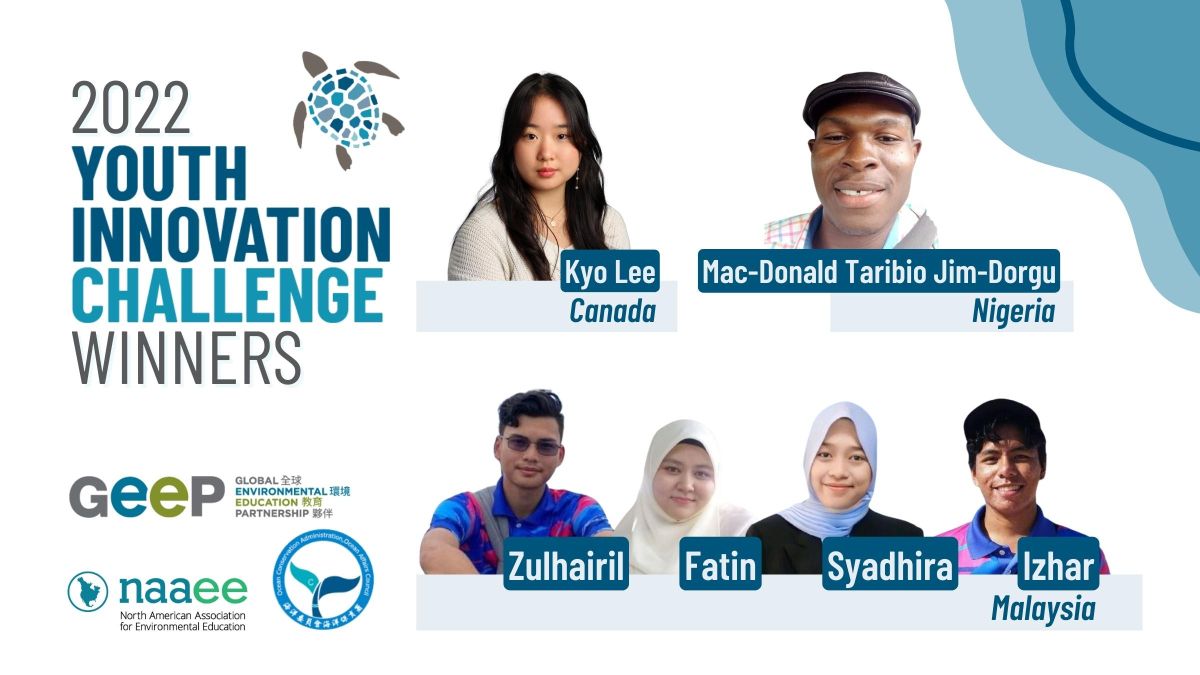Image

Date
Category
Program
- Global Environmental Education Partnership (GEEP)
News by: Ocean Conservation Administration
Responsible entity and spokesperson: OCA Deputy Director-General Hsin-Chen Sung
Phone: 07-3382057 #262021 or
0905-205669
Taiwan OCA and NAAEE Announce Winners of 2022 "Youth Innovation Challenge: Tackling Marine Debris"
The Taiwan Ocean Conservation Administration (OCA), in collaboration with the US Environmental Protection Agency (USEPA) and the North American Association for Environmental Education (NAAEE) through the Global Environmental Education Partnership (GEEP), called on young people aged 15–30 from countries around the world to share fresh ideas to tackle marine debris. This year, a total of eighty-four (84) innovations from thirty-two (32) countries were submitted to the Youth Innovation Challenge (YIC). Standing out from all the submissions, each of the fourteen (14) finalists will receive an e-certificate and communication toolkit. In addition, the top three (3) YIC winners were chosen from the finalists to receive a $1,000 USD grant.
We are excited to announce the winners of the second year of this challenge and share their innovative ideas to tackle marine debris:
1. Reducing Debris in Akassa Marine Environment Through Social Behavioural Change
Mac-Donald Taribio Jim-Dorgu | Yenagoa, Nigeria
Addressing the problem of marine debris in his region, Mac-Donald Taribio Jim-Dorgu aims to organize and facilitate town hall meetings with influential community leaders—including traditional rulers, youth leaders, women groups, faith-based organizations, and leaders of African traditional religion—across 20 coastal communities in Nigeria. The goal of this solution is to use environmental education as a lifelong learning tool to inculcate awareness of the importance of marine ecosystems in relation to human health, food security, equity, and climate change. The town hall meetings will use research-based communication tools, including Focus Group Discussion (FGD) and Community Mapping (CM) to explore the causes, effects, and solutions to marine debris in these communities. Through these town hall meetings, communities will be encouraged to develop Community By-Laws against pollution and littering practices, and Community Marine Protection Vanguards to protect nearby coasts. This solution will also get community members involved through organized beach cleanups, where volunteers can sell the plastic they collect to local recycling companies.
Watch Mac-Donald Taribio Jim-Dorgu’s Video >
2. The Ocean’s Story: Performing Arts to Save the Sea
Kyo Lee | Waterloo, Canada
After noticing the vast number of audiences reached by her school's grand musicals, Kyo Lee envisioned The Ocean's Story, a school-wide theatrical project designed to mitigate the impacts of marine pollution in every stage of the production, from scripting to performance to education. In collaboration with her school's drama department, Kyo's project will include a five-step process to write and perform a theatrical piece that would educate the community about marine debris in her region. The first step of this process will involve environmental education about marine debris and then will mobilize students to collect litter through a community-wide beach cleanup. Materials from the beach cleanup that can be reused will later be used to create costumes, props, and sets. The next steps of the process include student-led scriptwriting using research on the issue of marine debris, prop and set design, and a grand performance for the community. The performance will be an opportunity to raise awareness for marine pollution within the region, imbuing thought, discussion, and action that will create a positive ripple effect for the wider community.
3. Litter Barrier
Muhamad Zulhairil Danial Bin Mohd Zulkifli li, Nur Fatin Fitrah Binti Ahmad Kamal, Nur Syadhira Binti Mohd Razali, & Muhammad Ismar Izhar Bin Ishak | Terengganu, Malaysia
Recognizing the presence of litter in rivers and its harm to waterways and ultimately the ocean, Muhamad Zulhairil Danial Bin Mohd Zulkifli (Zulhairil) and his teammates came up with a solution called Litter Barrier. Little Barrier is a floating litter trap made out of affordable (and glow-in-the-dark) materials that can be placed along the shoreline of river beds to collect floating debris. This is a feasible way to kickstart river management among local communities in Terengganu. With a focus on youth, this team will host workshops and lectures to provide education about the problem of marine debris and give tutorials on using Litter Barrier to local communities. Any plastic collected in the litter traps can be sold to recycling companies, providing a source of income for local community members.
Watch Zulhairil’s Team Video >
“We appreciate the North American Association for Environmental Education running YIC for the second year. The passion and creativity in this year’s submissions are inspiring. Marine debris has become a pressing worldwide issue. We look forward to seeing this challenge help raise public awareness and reduce marine debris. We hope these ideas from young people’s point of view encourage public and private sectors to address marine debris in more innovative ways.” —Julia Hsiang-Wen Huang, director general, Ocean Conservation Administration, Taiwan.
“We are so excited to recognize the 2022 YIC winners and finalists—a talented group of creative problem-solvers who work directly with their local communities to protect marine ecosystems. These outstanding young innovators are an inspiration to all of us and show that education is a powerful tool to help tackle our most pressing issues.” —Judy Braus, executive director, North American Association for Environmental Education.
Check out GEEP’s website to learn more about the finalists and winners this year and watch their pitch videos.